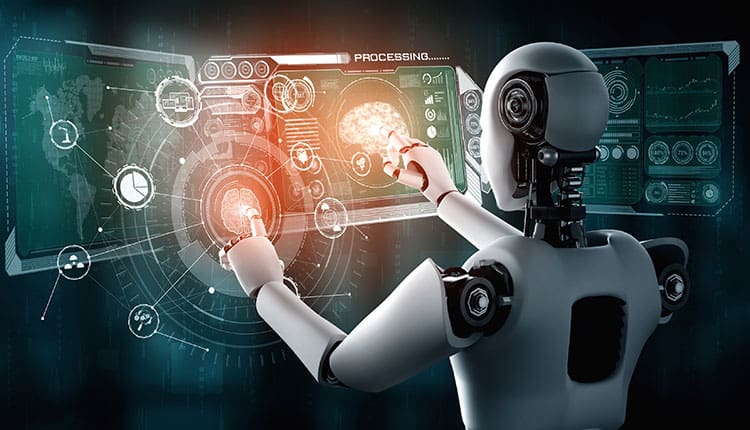In today’s rapidly evolving industrial landscape, the integration of AI for continuous improvement has become a pivotal strategy for enhancing quality assurance processes. As industries strive for excellence, the role of AI in achieving quality improvement has never been more significant. This article will explore how AI is being utilized to foster continuous improvement, driving industries towards unprecedented levels of efficiency and quality.

The Role of AI in Quality Assurance
The deployment of AI technologies within quality assurance frameworks is not just a trend but a necessity. AI’s capabilities in data processing and pattern recognition make it an invaluable tool for enhancing quality standards. By leveraging AI, industries can achieve a consistent level of quality that meets or exceeds customer expectations.
AI-Driven Quality Inspections
One of the most significant advancements is the use of AI in automated visual inspections. AI systems are capable of detecting defects with a precision that surpasses traditional methods, ensuring that products meet quality standards before reaching the consumer. This not only improves product quality but also reduces the cost of rework.
Predictive Quality Analytics
AI’s ability to analyze data enables predictive analytics, allowing companies to foresee potential quality issues before they arise. By identifying patterns and trends, AI systems can provide actionable insights that help in preemptive decision-making, thereby enhancing the overall quality management process.
Benefits of AI in Continuous Improvement
The integration of AI for continuous improvement offers numerous benefits, including enhanced efficiency, reduced costs, and improved product quality. By automating routine tasks and providing data-driven insights, AI empowers quality assurance teams to focus on strategic improvements rather than operational details.
Efficiency and Cost Reduction
AI technologies streamline processes and reduce the need for manual inspections. By automating repetitive tasks, AI not only reduces labor costs but also minimizes human error, leading to significant cost savings and increased operational efficiency.
Enhanced Decision-Making
AI provides quality assurance teams with comprehensive data analysis, enabling informed decision-making. By understanding complex data sets, AI helps in identifying the root causes of quality issues, leading to more effective solutions and continuous process improvements.
Challenges and Solutions
While AI offers numerous advantages, its implementation in quality assurance also presents challenges such as data privacy concerns and the need for skilled personnel. However, these challenges can be mitigated through strategic planning and investment in workforce training.
Data Privacy Concerns
The use of AI involves handling vast amounts of data, raising concerns about data security and privacy. Companies must implement robust data protection measures to ensure compliance with regulations and maintain customer trust.
Skill Development
Implementing AI requires a workforce skilled in both AI technologies and quality assurance processes. Investing in training and development is crucial to overcoming the skills gap and maximizing the benefits of AI integration.
Future of AI in Quality Assurance
The future of AI in quality assurance looks promising, with ongoing advancements in AI technologies continuing to revolutionize the industry. As AI becomes more sophisticated, its ability to enhance quality assurance processes will only grow, paving the way for unprecedented levels of quality and efficiency.
Emerging Trends
Emerging trends such as Edge AI and machine learning are set to redefine quality assurance. These technologies offer real-time data processing and decision-making capabilities, further enhancing the speed and accuracy of quality control processes.
AI and Human Collaboration
The collaboration between AI and humans will be key to unlocking the full potential of AI in quality assurance. By complementing human expertise with AI’s analytical capabilities, industries can achieve a level of quality that was previously unattainable.
Conclusion
The integration of AI for continuous improvement in quality assurance is transforming the way industries operate. By leveraging AI technologies, companies are not only enhancing product quality but also achieving significant cost savings and operational efficiency. As AI continues to evolve, its role in quality assurance will become increasingly vital, driving industries towards a future of excellence and innovation.

FAQ
What is the role of AI in quality assurance?
AI plays a crucial role in quality assurance by automating inspections, analyzing data for predictive insights, and enhancing decision-making processes, ultimately improving product quality and operational efficiency.
How does AI enhance continuous improvement?
AI enhances continuous improvement by providing data-driven insights, automating routine tasks, and enabling predictive analytics, allowing companies to proactively address quality issues and streamline processes.
What are the challenges of implementing AI in quality assurance?
Challenges include data privacy concerns and the need for skilled workers. Companies must invest in robust data protection measures and workforce training to fully realize the benefits of AI integration.
This article contains affiliate links. We may earn a commission at no extra cost to you.

